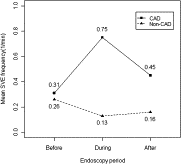Emergency endoscopy for upper gastrointestinal bleeding in patients with coronary artery disease☆☆☆
Affiliations
- Department of Internal Medicine, National Taiwan University Hospital, Yun-Lin Branch, Yun-Lin County 640, Taiwan
Affiliations
- Departments of Internal Medicine, National Taiwan University Hospital and College of Medicine, National Taiwan University, Taipei 100, Taiwan
Affiliations
- Departments of Internal Medicine, National Taiwan University Hospital and College of Medicine, National Taiwan University, Taipei 100, Taiwan
- Division of Biostatistics, Graduate Institute of Epidemiology, and Center of Biostatistics Consultation, College of Public Health, National Taiwan University, Taipei 100, Taiwan
Affiliations
- Departments of Internal Medicine, National Taiwan University Hospital and College of Medicine, National Taiwan University, Taipei 100, Taiwan
Affiliations
- Division of Biostatistics, Graduate Institute of Epidemiology, and Center of Biostatistics Consultation, College of Public Health, National Taiwan University, Taipei 100, Taiwan
Affiliations
- Division of Biostatistics, Graduate Institute of Epidemiology, and Center of Biostatistics Consultation, College of Public Health, National Taiwan University, Taipei 100, Taiwan
Affiliations
- Departments of Internal Medicine, National Taiwan University Hospital and College of Medicine, National Taiwan University, Taipei 100, Taiwan
Affiliations
- Departments of Internal Medicine, National Taiwan University Hospital and College of Medicine, National Taiwan University, Taipei 100, Taiwan
Affiliations
- Department of Internal Medicine, E-DA Hospital and I-Shou University, Kaohsiung County 824, Taiwan
Affiliations
- Department of Internal Medicine, National Taiwan University Hospital, Yun-Lin Branch, Yun-Lin County 640, Taiwan
- Departments of Internal Medicine, National Taiwan University Hospital and College of Medicine, National Taiwan University, Taipei 100, Taiwan
Correspondence
- Corresponding author. Department of Internal Medicine, National Taiwan University Hospital, Taipei, Taiwan.

Affiliations
- Department of Internal Medicine, National Taiwan University Hospital, Yun-Lin Branch, Yun-Lin County 640, Taiwan
- Departments of Internal Medicine, National Taiwan University Hospital and College of Medicine, National Taiwan University, Taipei 100, Taiwan
Correspondence
- Corresponding author. Department of Internal Medicine, National Taiwan University Hospital, Taipei, Taiwan.
To view the full text, please login as a subscribed user or purchase a subscription. Click here to view the full text on ScienceDirect.

Fig. 1
Mean frequencies of SVE of patients, stratified by group (CAD vs non-CAD) and endoscopy periods. The P values of the before, during, and after endoscopy period for the 2 groups were .498, .018, and .773, respectively, with the Wilcoxon rank sum test.
Fig. 2
Mean frequencies of VE of patients, stratified by group (CAD vs non-CAD) and endoscopy periods. The P values of the before, during, and after endoscopy period for the 2 groups were .007, .003, and .0001, respectively, with the Wilcoxon rank sum test.
Fig. 3
The proportion of patients with ST ischemia, stratified by the group (CAD and non-CAD) and endoscopy period. The P values of the before, during, and after endoscopy period for the 2 groups were .111, .015, and .015, respectively, with the Fisher exact test.
Fig. 4
Power spectral analysis of HRV, including the mean LF and HF powers of patients, stratified by the groups of CAD and non-CAD and the endoscopy periods.
Abstract
Background
Endoscopy is useful for diagnosis and treatment of upper gastrointestinal bleeding (UGIB). However, both endoscopy and UGIB may compromise the cardiovascular function. The present study is to investigate the cardiovascular responses of emergency endoscopy for patients with UGIB and stable coronary artery disease (CAD).
Methods
Consecutive 50 patients with known CAD and 50 patients without CAD history (non-CAD group) in whom emergency endoscopy was requested for UGIB were prospectively enrolled. All patients received ambulatory electrocardiographic monitoring before, during, and after endoscopies. Cardiac indices including supraventricular and ventricular arrhythmia, ST ischemic change, and autonomic nervous function evaluated by heart rate variability were compared.
Results
All patients in both groups had successful primary hemostasis, and peptic ulcer bleeding was the main etiology (82%). Compared with the non-CAD group, patients with CAD had a significantly higher incidence (42% vs 16%, P = .004) and frequency (1.19 vs 0.12 events per minute, P = .003) of ventricular arrhythmias during endoscopy. Nine patients with CAD and 1 patient without CAD had ischemic ST changes (P = .016). Comorbidity with congestive heart failure was not only associated with a higher frequency (P = .02) but also a more severe fluctuation (P = .002) of ventricular arrhythmia. None in both groups had angina or MI before, during, or after endoscopy. Heart rate variability did not show a difference.
Conclusions
Ventricular arrhythmias and myocardial ischemia, although mostly subclinical, were common in patients with stable CAD undergoing emergent endoscopy for UGIB, especially in those with concomitant congestive heart failure.
To access this article, please choose from the options below
Purchase access to this article
Claim Access
If you are a current subscriber with Society Membership or an Account Number, claim your access now.
Subscribe to this title
Purchase a subscription to gain access to this and all other articles in this journal.
Institutional Access
Visit ScienceDirect to see if you have access via your institution.
☆The study was supported by research grants from the National Taiwan University Hospital, Taipei, Taiwan (94S162).
☆☆ClinicalTrials.gov (Identifier: no., NCT00173511).
Related Articles
Searching for related articles..


